|
We are happy when we are weak but you are strong. We pray for this: that you will be made complete. 2 Cor 13:9 -Rev. Evan Dolive- The old saying goes that the only things that are certain in this life are death and taxes. While these thing are unavoidable, I would contend that another item needs to be added, change. Change: that mystical force that lies in wait until things get settled, comfortable and normative, then it leaps out of the bushes and catches us all by surprise. These shifts in our life can be met with great strife, push back and even anger. Once I was in an electronics store and I overheard a customer complaining about her cell phone. Her phone had updated to the newest operating system and the interface was not what it used to be and she was not happy. I felt bad for the young guy who had to hear her onslaught about how she did not like the new update and all but demanded that he call the manufacturer and let them know that this was unacceptable. He tried his best to show her that things had not really changed as much as she had envisioned but it wasn’t the same. 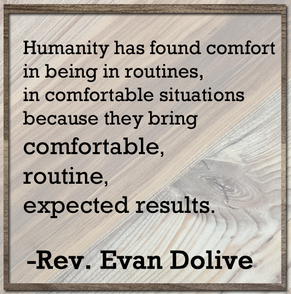 Change had come, no one had asked her and there was nothing she could do about it. Humanity has found comfort in being in routines, in comfortable situations because they bring comfortable, routine, expected results. What is it about change that frightens us? What is it about change that makes us shift in our seat, that makes the hairs on the back of our neck stand up? What about change in the church? One of the main critiques of the church is that it is antiquated and stuck in the past. While on some levels this is true but on others it is not. Change in our personal experience while inconvenient at times is something that we generally accept and learn to live with. Have you ever been in a store where they rearranged? Sure the first few times it was difficult but you adjust. What about when the city builds new roads or intersections for better travel? The first few times driving might be a bit scary but we adjust. When it comes to faith, change is something that we do not want to speak about or even want to entertain. We have our own understandings of the world, God and faith and thinking differently in some communities is not actively pursued or promoted. Isn’t change what we are looking for in faith? Many people come to faith as an escape or change from the previous life they were living. There was something unsatisfying, unfulfilling; they wanted to connect more, they wanted to feel more, they needed something to show them that there was a different path to take. There are so many people whose stories have been about the radical, life giving change found within the teachings and relationship with Jesus the Christ. It was not a fleeting feeling or even just one time event but it was a shockwave that was sent through their life and their being. They are not the same person after this experience. There is something that we long for when we search for something greater than ourselves, for a fuller expression of ourselves and of God. 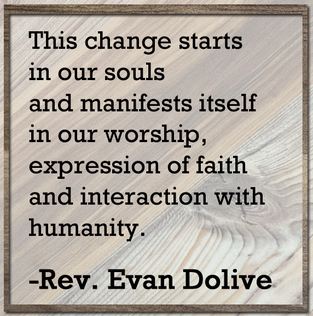 This change starts in our souls and manifests itself in our worship, expression of faith and interaction with humanity. We can't fake this. It is something that originates deep within us. If our faith compels us to change from the old ways we were living, change to a new way to understand Christ, why do we feel the need to stay the same? This however is not shown in the current modern American culture. Society tells us that change is something that comes in the bottom of wrinkle remover bottle, in a pill or through a computer program; the human form is a piece of clay that needs to be modeled into the likeness of cultural appropriateness and form. With this outlook humanity is seen less like a wonderful creation of God but something that is constant need of repair and change. Out faith however does not mirror this sentiment. Change is possible but perfection is not. The perfection or completeness we seek in this life is never attainable, it is a process that takes a lifetime. CS Lewis articulates this thought but extends further by stating that this perfection which only found in God is only complete when we pass on from this life. Lewis’ sentiment is one that that I believe we as followers of Christ have all had during our faith journey. Can we find completeness in the world? No, we only find this that do not fill us the way that that Christ's mercy and love can. Being open to the movement of God and working of the Holy Spirit allows us to more in tune to what God is up to in the world around us. The change we seek most likely will not be physically evident, rather having a change of heart, mind and spirit will overflow into our lives, ministry and work. Paul in 2 Corinthians sums it up well when he wrote: We pray for this: that you will be made complete. Striving for completeness in the world will leave us empty; let us find wholeness, completeness and peace in God. Amen. Rev. Evan M. Dolive is an ordained minister in the Christian Church (Disciples of Christ) and Associate Minister of Family Life at First Christian Church (Disciples of Christ) in Longview, Texas. He earned his M.Div. from Lexington Theological Seminary. His first book Seeking Imperfection: Body Image, Marketing and God was published by the Pilgrim Press. Dolive has appeared on Headline News, Huffington Post Live, and CNN as well featured on churchleaders.com and Sojourners. He writes for various online publications as well as the Longview News Journal. Dolive is married to his high school sweetheart and has three children. Follow Rev. Evan on social media: @RevEvanDolive on Twitter and fb.com/evandoliveauthor on Facebook. Hearing that Jesus had silenced the Sadducees, the Pharisees got together. One of them, an expert in the law, tested him with this question: ‘Teacher, which is the greatest commandment in the Law?’ Jesus replied: 'Love the Lord your God with all your heart and with all your soul and with all your mind. This is the first and greatest commandment. And the second is like it: 'Love your neighbor as yourself. All the Law and the Prophets hang on these two commandments.’ Matthew 22:34-40 -Jessica Nettles- I love spring. Flowers bloom and the days get longer. The temperatures rise and there is this essence of change that flows over all of us. Change has been a theme for me in my life the last few months and one of the changes has been in how I care for myself. I have changed the way I eat and how I exercise. Yes, I know that neither the scripture nor the quote have nothing to do with either, but keep reading. I promise that I’m not going to go off on a meditation about food or getting off the couch. One my favorite ways to exercise is to walk. If I could live in a village where I could walk to market and work and everywhere, I would live there forever. As soon as it got warm, I made a decision to start walking a few days a week if I could. At first, it wasn’t easy to convince myself that this was a good idea. I live close to a major thoroughfare and to go to the national park that is nearby, I have to cross that thoroughfare on foot. I also have to walk alone, which triggers all sorts of fears for me. The first day I tried this, it was sort of a lark. I walked to the neighborhood entrance. Then I walked to the corner to cross the thoroughfare. The signed beeped, and then I ran across all five lanes and made it to the other side! I walked three miles that day. Over the weeks since that day, I have continued to walk as much as I can. The more I do it, the easier it is to keep going. I have cleared nine miles in one walk and know that I can do more if I want. I have had experiences with people who don’t understand my walking or how far I go. They say things like, “Wow! Nine miles? ! That would kill me!” My answer is a lot like the old saint’s answer, “Not if you just do it.” There was a time when I thought that sort of thing would kill me too, but, instead, it has made me stronger and feel excellent.  Jesus’s answer to the tricky, legalistic Sadducees is just as simple: Love God. Love All People. I am guilty of responding to this just like the people who respond to my long-distance walking: “Wow! Love God?! Love ALL people? That’s HARD!” The real question is, “Why?” Why are these two commandments hard at all? What excuses do we make to not do those things? When people say, “That would kill me,” about walking so far, what they are really saying is that they have stuff in their head that says that they can’t. Maybe some of that stuff is reasonable. If you are suffering terminal illness (although I had a friend who ran marathons right up till two months before she died of terminal cancer—Cindy was amazing!), or you are just unable to walk, I get it. Sometimes, we have very unreasonable excuses though. My excuses have included things like not being very athletic, being too tired, being afraid of going alone, or just being afraid (which is the base truth of the matter). When we say that these commandments are hard, we are also saying that because there is stuff that we hide behind to keep us from that love. In the end, many of the things that keep us from the commandments are fear based. We are afraid of loving God because we have learned about her as a construct instead of who she is beyond what others say about her. We are afraid of loving our neighbors (people…everyone) because we also see them as constructs and in ways we have been told to see these people. It is hard because we have to look past all of that, and sometimes those constructs have been built inside of us for a long time. We have to come to the same place that I came to that first time I walked to the entrance of the neighborhood that first day I walked. I could have chosen to make it hard on myself and told myself that I couldn’t walk to the park. I could have made excuses. I could have chosen fear. It is the same with when we love. We can choose to not even try. We can tell ourselves that it is easier to not love God and to not love ALL people. Love is a choice, just like walking three miles to the national park is a choice. If we choose to not exercise, or not to love, then we will miss an important learning moment, and that is this: “It is easy for those who do it.” Once you choose to love, even once, the next time you choose to love, it will be easy. You will want to choose it again and push love farther. That push will allow you to do things like see people who are scary as people who need love too. It will allow you to see God in those people too. I have two friends who inspire the heck out of me. One is an athlete. He hikes long distances (much farther than nine miles), and recently made it to the Georgia/North Carolina border of the Appalachian Trail. He has inspired me to not fear getting out and trying to push myself. The first day I walked, I text messaged him and asked how far I should go. I will never forget his answer, “Walk as far as you can, and then add a mile to it.” I think about this every time I walk now. He will never realize how much that advice stoked me on my exercise journey. My other friend is a minister in Atlanta. She serves the homeless. She loves people who society has thrown out like so much garbage. She cares for the scary people. I see her work and her joy and her love and I want to love people like she loves them. Her ministry has taught me to serve my students better and to remember to love others even in their stark differences from my personal experiences. “It’s easy for those who do it.” The lesson here, in my mind, is in the “do it,” part of the quote. Do you want to love God? Then love God. Do you want to love people? Then love people. Make it a daily, hourly, moment-to-moment experience. Make it a conscious choice. Love is not an emotion. It’s not what you see in the movies. It is an action. It is a choice. It is an easy choice, if you just choose it. --- Dear God: Help us to see our excuses for what they are---fear in word form. Help us to see you as what you are—pure love. Help us to see our neighbors as what they are---people just like us who need love just like we need love. Help us see how easy loving you and others is if we just do it. Amen Jessica Nettles has been writing since she was eleven-years-old, and knew at that time that writing would be something she did for her lifetime. She has not become more than semi-famous, but that’s something that she has accepted. Her current projects include writing Southern gothic horror fiction, chapters for an upcoming interactive English textbook, and information gathering for several upcoming coloring books. Her past lives include being a Methodist minister’s wife, a Starbuck’s barista, a college and grad school student (with honors both times), and a clerk at Barnes and Noble. Despite her wide and varied experiences, she still has managed to grow a love of God and Biblical Studies. She currently lives within walking distance of a national battlefield, has two adult children who are definitely their own people (she’s not proud of them at all…), and two black cats. In her current life, she teaches English at a local technical college, and is looking fifty in the eye and daring it to cross the line into her life. We’ll see how that goes. It is not good to eat much honey, or to seek honor on top of honor. Like a city breached, without walls, is one who lacks self-control. Proverbs 25:27-28 -Tyler Jarvis- I am all about moderation. Or rather, I am moderately about moderation. Okay that was a bad joke. Actually, I’m usually not very good about moderation at all. I don’t have drinking problems or anything, but I am a huge Texas Rangers fan (which occasionally makes me think about adopting a drinking problem). There are 162 games in a baseball season, and in any given year, I probably watch about 130 of them. I have a multiplicity of Texas Rangers hats and t-shirts, a couple of jerseys, and even a pair of Texas Rangers socks. I plan my schedule around the Texas Rangers. I go to great lengths to ensure that I’m somewhere with a TV tuned to the Rangers every time they’re playing. What? I’m fine. As long as it doesn’t detract from other aspects of my life, then what’s the problem? 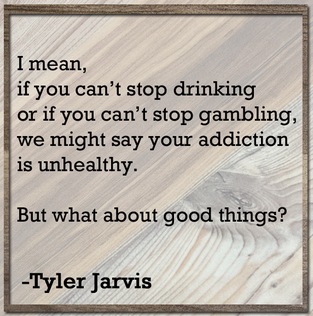 I mean, if you can’t stop drinking or if you can’t stop gambling, we might say your addiction is unhealthy. But what about good things? What about things like Texas Rangers baseball? What about ice cream? Or reading? Or spending time with friends? If God has blessed us with something, doesn’t God want us to enjoy that as much as we can? But the writer of Proverbs says it is not good to eat too much honey. What’s not good about too much honey? I mean, how many people throughout history have had their lives ruined by a crippling honey addiction? Things like eating too much honey, watching too much baseball, owning too many Apple products, or sleeping too much don’t strike us as bad as alcoholism, gambling addictions, or pornography addictions because they don’t seem to hurt anyone. But the writer of Proverbs doesn’t agree that these kinds of addictions are harmless. And C. S. Lewis hammers that point home in his own quote on the matter. Just because you’re not falling down in the street over it, doesn’t mean it isn’t spiritually damaging you. An addiction doesn’t have to cripple you in order to be spiritually damaging. It just has to define you. 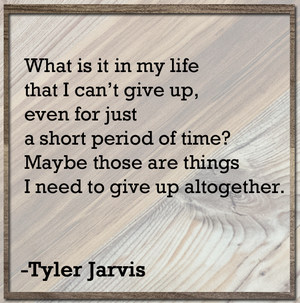 I recently heard a friend say, “Anything you cannot fast from from owns you.” And maybe that’s a good metric for us to use. What is it in my life that I can’t give up, even for just a short period of time? Maybe those are things I need to give up altogether. Jesus tells us that we can’t serve two masters. So if we can’t give something up, it becomes our master. Even if we’re not falling down in the street over it. As C. S. Lewis says, God is not deceived by externals. I may appear to have it all collected and in order on the outside, but God knows when I’ve let other things take God’s place as Lord in my life. But I also don’t want to swing too far the other way. Proverbs doesn’t say, “don’t eat honey or seek honor.” Those things are good things! God has given us blessings that I think God wants us to take advantage of. God is not opposed to baseball games, or ice cream, or honey. God created those things so that we could enjoy them! I really believe that God gets enjoyment out of our enjoyment of life. But one of the fruits of the spirit is self-control. It’s there right after gentleness. When the Holy Spirit of God lives within us, we exercise restraint on how we partake in the blessings God has given us, because we only have one Master. And it’s not Texas Rangers Baseball. It’s not the delicious taste of honey. It’s not curling up with a good book. It’s the God of the Universe, who calls us to belong fully to God’s self Tyler Jarvis is a youth minister and occasional writer. He's entirely too good at Guitar Hero, and entirely too bad at the real guitar. He also enjoys writing about himself in the third person. You can read more of Tyler's articles at tylerjarvis.wordpress.com/ and follow him on Twitter at @Tyler_Jarvis. 54 After they arrested Jesus, they led him away and brought him to the high priest’s house. Peter followed from a distance. 55 When they lit a fire in the middle of the courtyard and sat down together, Peter sat among them. 56 Then a servant woman saw him sitting in the firelight. She stared at him and said, “This man was with him too.” 57 But Peter denied it, saying, “Woman, I don’t know him!” 58 A little while later, someone else saw him and said, “You are one of them too.” But Peter said, “Man, I’m not!” 59 An hour or so later, someone else insisted, “This man must have been with him, because he is a Galilean too.” 60 Peter responded, “Man, I don’t know what you are talking about!” At that very moment, while he was still speaking, a rooster crowed. 61 The Lord turned and looked straight at Peter, and Peter remembered the Lord’s words: “Before a rooster crows today, you will deny me three times.” 62 And Peter went out and cried uncontrollably. Luke 22:54-60 CEB -Kristy Burmeister- It’s not sinful to be afraid. It’s in our nature to feel fear. Fear can be helpful, after all. Fear is what keeps me from wandering around the woods at night and dying of hypothermia. Fear is what keeps me from hitchhiking to Texas every winter when I get tired of being buried in five feet of snow. Fear itself isn’t harmful. It’s the choices we sometimes make as a result of that emotion that can be harmful. Sometimes we choose to be brave. We choose to face our fear and do what’s right, no matter how afraid we are.  Sometimes we choose cowardice. We choose to cow to our fear and do what’s easy rather than what’s right. I’ve always had a hard time with Peter. (I’ve always been more of a Paul girl.) He confuses me. In the same night, we see two very different sides of this man. In the book of John, we see Peter jump to Jesus’ defense, and hack off the ear of a guard who’s come to arrest Jesus. That seems like a brave enough act. However, shortly afterwards, when Peter is identified as a follower of Jesus, he’s so filled with fear that he denies it. That’s a pretty quick turnaround. Maybe after his arrest-fueled adrenaline high had worn off, he stopped to think things through. What would happen to him if he was associated with Jesus? Would he be imprisoned? Tortured? Executed? He could do the right thing—the honest and honorable thing—and admit he was one of Jesus’ disciples or he could do the easy thing—the safe thing—and lie. He chose cowardice, and because of that cowardice, he wasn’t present at the foot of the cross as Jesus was crucified. Now, I don’t mean to come down on Peter too harshly. He was redeemed in the end, and died a martyr’s death. I’ve wondered why the authors of all four gospels chose to include Peter’s cowardly denial in their accounts. Wouldn’t it make a much better story if Peter was some cool action-figure type of guy who tried to storm the Sanhedrin with Andrew? It’d certainly put him in a better light.  But putting Peter in a good light wasn’t the point. I can’t know for sure why this story was included, but I think they included it to show that everyone, even the most loyal of Christ’s followers, can fall prey to cowardice. None of us are safe, and all of us should be aware of our own inclinations toward cowardice. Because if we think we’re safe, that it can’t possibly touch us, then it’s so much easier to fall into the trap. We start justifying our actions. “Oh, it’s not really cowardice. What good would it do if I died alongside Jesus? I’m just living to preach another day.” How can we combat cowardice if we don’t recognize it? The solution isn’t to deny our fears. Acknowledge your fears. Bring them out into the light and see them for what they are. Be afraid. Be terrified. Shake in your boots so hard the soles fly off. Then, choose bravery and do the right thing anyway. Kristy is an ex-Mennonite adult PK who blogs about life, active pacifism, and wandering through the spiritual wilderness at kristyburmeister.com while consuming ridiculous amounts of coffee and pie. |
Categories
All
Archives
October 2023
|


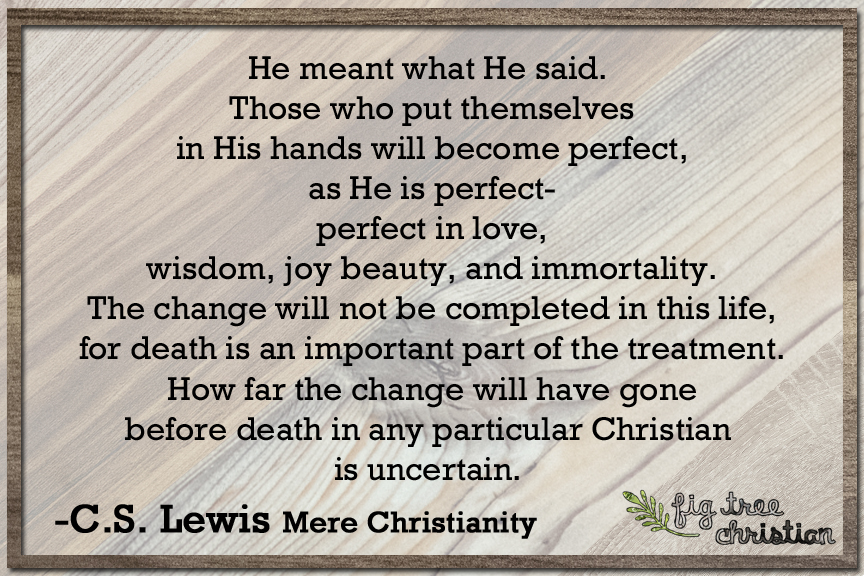
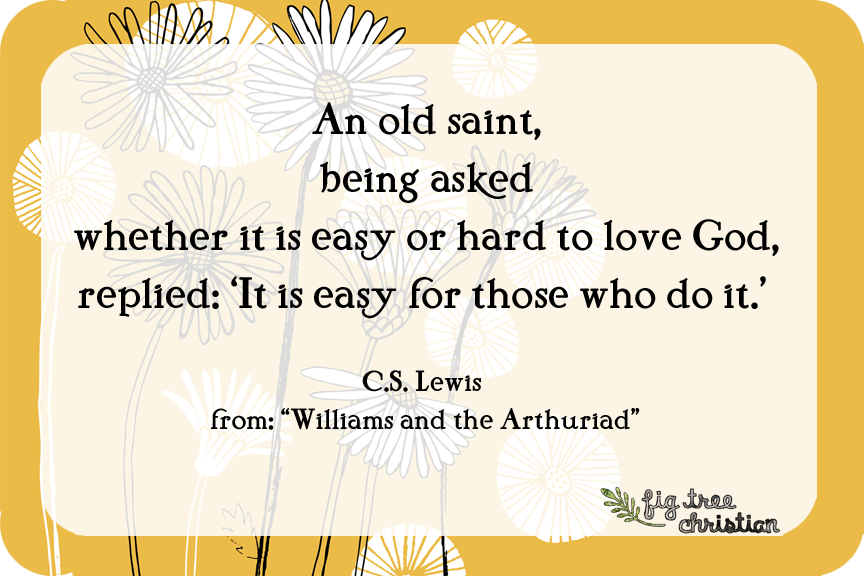



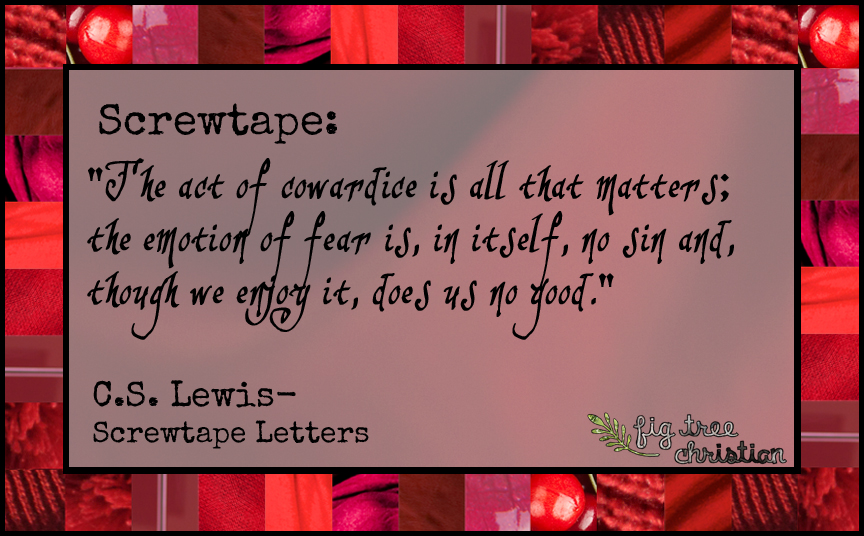

 RSS Feed
RSS Feed